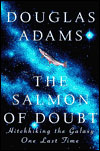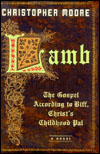
Comment
on this story
|
 |

Tragedy abounds in comic offerings
by Paul Lewis
Douglas Adams, along with the chaps from Monty Python, probably defined British humor to most of us. When he died on May 11, 2001, he left behind a small yet significant body of work whose influence reached far beyond the bookstore; it had saturated our culture and influenced the way we perceive life, the universe, and everything.
Adams hated deadline pressure, and his final novel was only half-finished, at best, when he passed away. However, due to a technophilia unbounded, Adams had all sorts of juicy material on several Macintosh hard drives, and it stands as a testament that random artifacts from that collective retain a powerful sense of purpose and playfulness. They've been collected in The Salmon of Doubt: Hitchhiking the Galaxy One Last Time (Harmony, $24), along with Adams' editor's best possible version of his fragmented final novel, a Dirk Gently tale titled The Salmon of Doubt.
The lovable part of this tome is the peek into the life and passions of Adams. Though they're easily inferred from his work as a whole, it's energizing and insightful to read his direct thoughts in addressing those interests. He loved music; Procol Harum, Bach, and The Beatles; science and  technology; and animals, particularly endangered ones, of which he devoted much of his life to raising awareness. Rounding out the work are a variety of media interviews and essays for his website, the still active www.h2g2.com, which is the closest to a Hitchhiker's Guide we have here on Earth. technology; and animals, particularly endangered ones, of which he devoted much of his life to raising awareness. Rounding out the work are a variety of media interviews and essays for his website, the still active www.h2g2.com, which is the closest to a Hitchhiker's Guide we have here on Earth.
The Dirk Gently novel itself is frustratingly unfinished, with themes, plot, and story just being developed before it abruptly ends. It is surely the mark of both a fine comedian and tragedian that Adams would leave us with such a heartbreaking cliffhanger both to our minds and our hearts, as if his final embellishment was an act of humor that not even he could have foreseen.
Perhaps most ironic in this collection is an essay on the P.G. Wodehouse novel Sunset at Blandings, itself a final unfinished work by the author. When he writes of Wodehouse, "He's up in the stratosphere of what the human mind can do, above tragedy and strenuous thought, where you will find Bach, Mozart, Einstein, Feynman, and Louis Armstong, in the realms of pure, creative playfulness," it's more than obvious he could be, and truly is, speaking of himself as well.
An American who is doing his darnedest to carry on the mantle of the comic novel is Christopher Moore, and he's doing just fine, thank you very much. His five previous novels have dealt with such topics as demons on the loose in coastal California, Native American trickster gods come to life, sexy vampires in San Francisco, disgraced airline pilots ferrying contraband out of Micronesia, and ancient sea monsters who hate the blues. Now he turns his able pen towards the funniest topic remaining, the life of Jesus Christ, in Lamb: The Gospel According to Biff, Christ's Childhood Pal (Harperperennial, $13.95).
Moore's novels are great reads not just because they're funny, but because of a sense of danger and adventure that moves his storytelling. He turns the life of Christ and his best buddy Levi, known as "Biff" because of the number of times he gets smacked in the head for mouthing off, into a  rollicking yarn that might get more people interested in religion if it were read in Sunday school. It'll surely also cause controversy if some of the more fundamentalist Christian sects happen to pick it up, but such is the price of freedom of speech. rollicking yarn that might get more people interested in religion if it were read in Sunday school. It'll surely also cause controversy if some of the more fundamentalist Christian sects happen to pick it up, but such is the price of freedom of speech.
Lamb succeeds as both a coming-of-age tale and an action quest. It's related by Biff himself, resurrected by the angel Raziel to pen a new gospel filling in the details of Christ's missing years not included in the New Testament. Biff's recollections are interspersed with his musings on contemporary society and his conflicts with Raziel, who acts as his babysitter/watchdog. After causing plenty of trouble in Nazareth, teenagers Joshua (Jesus) and Biff set out to find the three wise men, and they learn many life lessons and tricks of the Messiah trade along the way. Also making an appearance is Catch, the antagonist of Moore's first novel, Practical Demonkeeping, who cuts a bloody swath through the proceedings.
Though I wish Moore would try something besides his "misfit hero learns greater truth and improves himself and the people around him" ur-plot, he's just plain entertaining enough, and profound enough, that you're glad to be along for the ride. While no one is or will be Adams any time soon, it's nice to know that the modern comic novel succeeds despite Adams' death, and that, like in the best of Adams' work, it still allows us to learn about ourselves while we laugh at ourselves.

April 10, 2003 * Vol. 13, No. 15
© 2003 Metro Pulse
|





